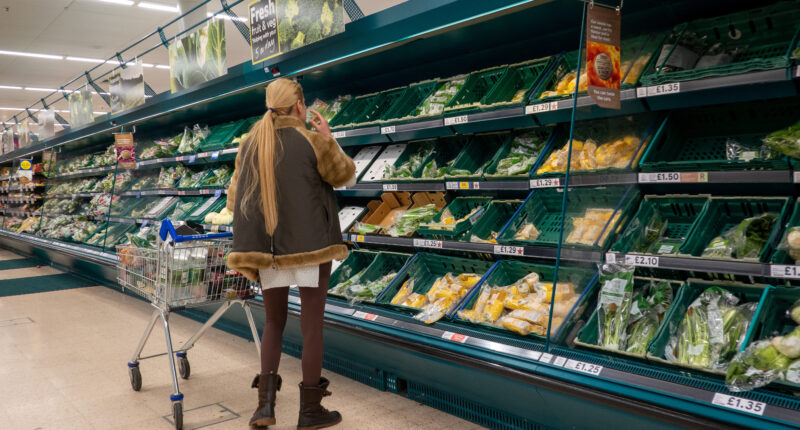SHOPPERS face an £811 grocery bill hike as the price of food continues to skyrocket.
Grocery price inflation has reached a record 17.1%, figures show.
This month marks a full year since monthly grocery inflation rose beyond 4%, analysts Kantar said.
Kantar said it was closely following the impact of vegetable and fruit shortages on sales in the coming weeks.
Fraser McKevitt, head of retail and consumer insight at Kantar, said: “Shoppers have been facing sustained price rises for some time now and this February marks a full year since monthly grocery inflation climbed above 4%.
“This is having a big impact on people’s lives.


“Our latest research shows that grocery price inflation is the second most important financial issue for the public behind energy costs.
“One quarter say they’re struggling financially, versus one in five this time last year. The numbers speak for themselves.”
Consumer price inflation, which represents the price of all goods and not just food, hit 10.1% in February.
High inflation makes everything much harder to afford.
Most read in Money
Meanwhile, shoppers are flocking to discount supermarkets to save money.
Aldi’s market share reached a record 9.4% and remains the fastest-growing grocer, with sales up by 26.7%.
It was closely followed by Lidl, which increased sales by 25.4% and achieved a market share of 7.1%.
Frozen food specialist Iceland increased its market share to 2.4%, up from 2.3% last year, as spending through its tills increased by 10.8%.
We’ve listed eight easy ways to slash your grocery bills by thousands every year.
1. Get a loyalty card – save up to £1,000 a year
Signing up for a supermarket loyalty card can often help you to get cheaper prices on essentials.
If you have a loyalty card, you may find you can get extra points or discounts, particularly if you buy petrol from the same supermarket.
The Sun recently compared the best supermarket loyalty cards in this handy guide.
Asda is the latest supermarket to promise shoppers extra perks, bringing it in line with Lidl, M&S, Morrisons, Sainsbury’s and Tesco.
But it’s worth comparing loyalty schemes – and remember you don’t have to stay loyal, despite the name.
Households can save up to £1,000 a year thanks to the exclusive deals offered to loyalty cardholders.
2. Take note of unit prices – save £100s
Unit prices are meant to make it easier for shoppers to compare similar items of different sizes.
You should be able to see the unit price of the product where its price tag is shown – it may be in small print.
Compare this with the unit price of a similar item – for example, the cost per 100ml or two different types of cola – and choose the item with the lowest unit cost.
Stores are obligated to show unit pricing, under legislation known as the Price Marking Order 2004.
With this in mind paying close attention to the unit prices of the staples in your shopping trolly could save you a fortune in the long term.
3. Known when to shop – save up to £500 a year
Heading to the shops when products are marked down and bright yellow discount stickers are applied can save you serious dough.
If you shop in the evening, you are more likely to find goods that have been marked down.
But each branch of a supermarket will have its biggest discounts at slightly different times of the day.
Seek out the “Middle of Lidl” deals updated on Thursdays and Sundays and the store’s “Pick of the Week” food offers.
Aldi has a fortnightly “Super 6” offer with six discounted items. The Co-op offers a £6 Freezer Favourite bundle.
We’ve put together a handy guide to what time supermarkets including Aldi, Asda, Tesco and Lidl reduce their prices.
Households could slash their grocery bills by up to £500 a year by keeping a lookout for yellow stickers and discount days.
4. Make a list and take stock – save up to £240 a year
One of the most common mistakes shoppers make is going out underprepared.
Always do a stock take before going shopping.
It will stop you from buying what you already have and it’s amazing how many great recipes can be made from a few storecupboard items already sitting there.
If you do need to go out make a list to help stay focused on getting the items you really need, rather than being drawn into impulse purchases.
Another tip is to choose a smaller trolley – or a basket, if possible – to shop with.
A bigger trolley will look emptier even after you’ve finished trawling the aisles, and can encourage you to pick up more items.
The average household can save up to £240 a year with this rule.
5. Swap to own brand – save up to £800 a year
Ditching items with labels like “finest” in favour of “own” or “value” can be worthwhile.
The Sun regularly tests supermarket own-brand products to see if they can beat the big brands.
M&S’s own brand custard creams cost just 35p and beat other supermarkets’ own brands to be crowned the best by The Sun.
You can also try checking frozen alternatives to fresh fruit and vegetables and looking on the lower shelves where customers are known to find better deals.
Households can save up to £800 a year by buying cheaper own-brand groceries.
6. Don’t ignore granny groceries – save up to £350 a year
Modern items such as liquid soap, shower gel and washing capsules mean you’re paying more for added water.
Switch back to what your gran would have bought, such as solid soap bars and washing powder.
Ariel washing capsules for your laundry can cost up to £11.99 per kg compared to Ariel washing powder at only £3.46 per kg.
Making the switch could slash the average grocery bill by £350 per year.
7. Ditch the kitchen roll – save up to £200 a year
Some big-name brands have hit £6 a pack, but you can buy three reusable microfibre cloths for £1 in Iceland.
Pop them in the wash after use then use them again.
Households can slash their bills by up to £200 a year by doing so.
8. Shop wonky – save up to £150
Strange-shaped fruit and vegetables taste the same but cost less.


For example, Morrisons sells wonky veg products from 39p, while Lidl’s £1.50 Too Good To Waste boxes contain a whopping 5kg of fruit and vegetables that may be slightly damaged or discoloured but is still perfectly good to eat.
Households that switch to buying wonky fruit and veg could save £150 a year.










